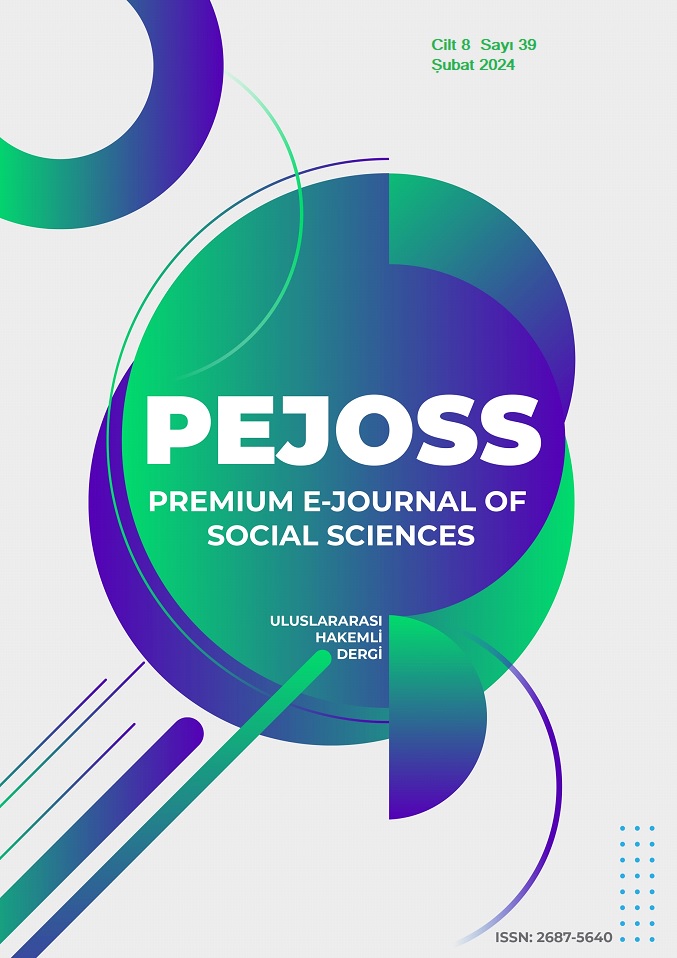What Is Religion? Features of Islam Religion
DOI:
https://doi.org/10.5281/zenodo.10760403Keywords:
Religion, Religions, Characteristics of the Islamic ReligionAbstract
Humankind's discussions about religions have continued since the beginning of the world. It is possible to see the traces of humanity's religions in this adventure of existence. Human beings, who have developed different beliefs and systems in different geographies, have created many beliefs. Every belief and religion has seen itself as the defender of truth and reality. The main aim of human beings here is to reach the unchangeable. When we look at the classical explanations, they express themselves with the argument that each different religion actually shows a single truth. This has continued from traditional religions to the present day. Religion continues to exist as the determinant of our lives. Explaining the concept of religion is not as easy as it is stated, it is a subtle and detailed issue that leaves people unclear about a clear definition. This difficulty and comprehensiveness is further complicated by the fact that different nations and communities, and members of each religion, express religion differently. If the concept of religion meant a certain religion, it would be easy to come up with a precise definition. In this context, we will examine the concept of religion, which has a great place in the lives of human beings. We will examine the meanings of religion and the unique features of the Islamic Religion. The study consists of two parts a conclusion. In the introduction part of the study, the subject, purpose, importance, method and problem of the research are presented. In the second part, the phenomenon of religion is emphasized and the studies on religions are presented. Each religion is examined within its own systematic and the basic characteristics of religions are briefly included. The relationship between religions is examined and the characteristics of Islam, which is our main subject, are revealed. Then, a general evaluation was made in the conclusion part. With this study, different perspectives on religion, which will occupy the most important part of people's lives for many years, have been examined and introduced into the literature.
Downloads
References
Akseki, A.H. (1943). İslam, Diyanet İşleri Başkanlığı Neşriyatı.
Alles, G. D. (2005). “Religion (Further Considerations)” md., Encyclopedia of Religion, (Edt., L. Jones), C.: XI, USA: Thomson, Gale.
Alston, W.P.(1972). “Din”, (Çev.: G. Tümer), Ankara Üniversitesi İlahiyat Fakültesi Dergisi, C.: XVIII, Ankara Üniversitesi Basımevi.
Aydın, M. S.(1987). Din Felsefesi, Dokuz Eylül Üniversitesi Yayınları.
Aydın, M.S. (2004). Dinler Tarihine Giriş, Din Bilimleri Yayınları.
Adıvar, A. (2000). Tarih Boyunca İlim ve Din, Remzi Kitapevi.
Cox, J. (2004). Kutsalı İfade Etmek, Din Fenomenolojisine Giriş, (Çev., F. Aydın), İz Yayıncılık.
Chevalier, J. (2000). Din Fenomeni, (Çev. M. Aydın), Din Bilimleri Yayınları.
Çalışkan, İ. (2002). Kur’an’da Din Kavramı, Ankara Okulu Yayınları.
Durkheim, E. (2005). Dini Hayatın İlkel Biçimleri, (Çev., F. Aydın), Ataç Yayınları.
Emiroğlu, K., Aydın, S. (2003). Antropoloji Sözlüğü, Bilim ve Sanat Yayınları.
Güvenç, B. (2005). İnsan ve Kültür, Remzi Kitabevi.
Gündüz, M. (2007). Yaşayan Dünya Dinleri, (Edt.: Şinasi Gündüz), Türkiye Diyanet İşleri Başkanlığı Yayınları.
Günay, Ü. Ve Güngör, H. (1998). Türk Din Tarihi, Laçin Yayınları.
Kutsalkitap (2023). https://www.kutsalkitap.org
Halil, İ. (2011). İslâm Tarihine Giriş, (Çev. Abdurrahman Şen), Mana Yayınları.
Mardin, Ş. (1992). Din ve İdeoloji. 5. bs. İletişim Yayınları.
Mardin, Ş. (1977). Din Sorunu Yeni Bir Düzeye Ulaşırken. Milliyet Gazetesi. 6.1.1977.
Mardin, Ş. (1993). Türk Tarihinde Nakşibendî Tarikatı, Çağdaş Türkiye’de İslâm. (ss. 71-98). Haz. Richard Tapper. Sarmal Yayınları.
Mardin, Ş. (2011). Türkiye, İslâm ve Sekülarizm. Makaleler 5. (Çev. Elçin Gen & Murat Bozluolcay). İletişim Yayınları.
Malinowski, B. (2000). Büyü, Bilim ve Din, (Çev., S.Özkal), Kabalcı Yayınevi.
Morris, B. (2004). Din Üzerine Antropolojik İncelemeler, (Çev., T. Atay), İmge Kitapevi.
Okumuş, E. (2015). “Fârâbî’nin Medeniyet Sosyolojisine Katkıları”, Diyanet İlmi Dergi, Temmuz-Ağustos-Eylül, C. 52, S. 3.
Pettazzoni, R. (2002). Tanrı’ya Dair, (Der. ve Çev., F. Aydın), İz Yayıncılık.
Sharpe, J. E. (2000). Dinler Tarihinde Elli Anahtar Kavram, (Çev., A. Güç), Arasta Yayınları.
Serdar, M. (2017). Harun, İslam İnanç Esasları, Kimlik Yayınları,.
Schimmel, A. (1999). Dinler Tarihine Giriş, Kırkambar Yayınları.
Söderblom, N. (1930). “Holiness” md., Encyclopedia of Religion and Ethics, (Edt., J. Hastings), Edinburgh.
Taplamacıoğlu, M. (1961). Din Sosyolojisine Giriş, Ankara Üniversitesi İlahiyat Fakültesi Yayınları.
Tümer, G. (1986). Küçük, A. (1993), Dinler Tarihi, Ocak Yayınları. Türkçe Sözlük, (2005), Türk Dil Kurumu Yayınları.
Tümer, G. (1994). “Din” md. ve “Din Bilimleri” md., İslam Ansiklopedisi, C.: IX, Türkiye Diyanet Vakfı Yayınları.
Tümer,G. ve Abdurrahman, K. (1993). Dinler Tarihi, Ocak Yayınları. Türkçe Sözlük, (2005), Türk Dil Kurumu Yayınları, Ankara.
Vergote, A. (2002). “Kutsal”, (Çev., H. Keskin; A.Yapıcı), Çukurova Üniversitesi İlahiyat Fakültesi Dergisi, C.: II, S.: II
Yaman, A. (2013). “Zimmî/Fıkıh”, Diyanet İslâm Ansiklopedisi, C. 44. ss. 434-438
Wach, J. (2004). Dinler Tarihi, Bilimsel Bir Disiplin Olarak Kuruluşuna Teorik Bir Giriş, (Çev., F. Aydın), Ataç Yayınları.
Wikipedia (2023). https://tr.wikipedia.org/wiki/
Downloads
Published
How to Cite
Issue
Section
License
Copyright (c) 2024 Premium e-Journal of Social Science (PEJOSS)

This work is licensed under a Creative Commons Attribution 4.0 International License.


